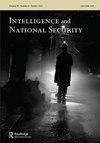Secret Alliances: Special Operations and Intelligence in Norway 1940-1945 – The British Perspective
IF 0.8
3区 社会学
Q1 HISTORY
引用次数: 0
Abstract
swarms, hypersonic weapons, and cyber capabilities. Johnson notes AI-enabled drone swarms could be used to gather intelligence on adversaries or engage in offensive and defensive missions. Johnson notes that relatively cheap and available drone swarms could easily be used as asymmetric tools against a more powerful adversary. Regarding AI-enabled hypersonic weapons, the author notes this too could be a destabilizing force in strategic stability since it would essentially reduce another state’s nuclear credibility. Finally, the author discusses how AI-enabled cyber operations will speed up decision-making time, and as a result questions at what point human decision-making might detract from the speed and precision needed for AI-enabled cyber operations. Johnson brings it all together in chapter 9 discussing the interplay of human psychology and intelligent machines. Undoubtedly, AI will bring some capabilities to human decision makers and at times improve their decision making. Yet, the author also notes, correctly, that this capability will likely increase the speed at which decisions are made and at times lead to suboptimal decisions. In a crisis situation, where empathetic and reflective thinking is needed most, accelerated AI-enabled decision making could erode stability. Moreover, Johnson discusses the network effects of superimposing AI technologies on to legacy nuclear command, control, and communications (NC3) systems. This is an important point that often goes unrecognized. By adding imperfect AI systems to vulnerable (and aging) NC3 systems, are we just compounding risk to our systems? Johnson accurately notes that this synthesis will likely increase ‘errors, distortions, and manipulations’, which in turn will erode strategic stability. While I loved Johnson’s newest work, it may not be accessible to all, and that’s okay. This book was not written for a broad audience or undergraduate students. It is written for strategic-level theorists with an interest in how emerging technologies will influence the environment. That is a niche audience. Luckily, I am part of that audience and Johnson’s contribution powerfully spoke directly to my academic interest and influenced how I view the future of warfare.秘密联盟:1940-1945年挪威的特种作战与情报——英国视角
蜂群、高超音速武器和网络能力。约翰逊指出,人工智能无人机群可以用于收集对手的情报或执行进攻和防御任务。约翰逊指出,相对便宜且可用的无人机群可以很容易地用作对抗更强大对手的不对称工具。关于人工智能高超音速武器,作者指出,这也可能是战略稳定的一股不稳定力量,因为这将从根本上降低另一个国家的核信誉。最后,作者讨论了人工智能网络作战将如何加快决策时间,并因此提出了人类决策在什么时候可能会降低人工智能网络行动所需的速度和精度的问题。Johnson在第9章中把这一切结合在一起,讨论了人类心理和智能机器的相互作用。毫无疑问,人工智能将为人类决策者带来一些能力,有时还会改善他们的决策。然而,作者也正确地指出,这种能力可能会提高决策的速度,有时会导致次优决策。在危机情况下,最需要同理心和反思性思维,人工智能加速决策可能会削弱稳定性。此外,Johnson还讨论了将人工智能技术叠加到遗留的核指挥、控制和通信(NC3)系统上的网络效应。这是一个经常被忽视的重要观点。通过将不完善的人工智能系统添加到易受攻击(和老化)的NC3系统中,我们只是在加剧我们系统的风险吗?约翰逊准确地指出,这种综合可能会增加“错误、扭曲和操纵”,进而削弱战略稳定。虽然我喜欢约翰逊的最新作品,但它可能不是所有人都能接触到的,这没关系。这本书不是为广大读者或本科生而写的。它是为对新兴技术将如何影响环境感兴趣的战略层面理论家而写的。这是一个小众受众。幸运的是,我是听众中的一员,约翰逊的贡献有力地直接表达了我的学术兴趣,并影响了我对战争未来的看法。
本文章由计算机程序翻译,如有差异,请以英文原文为准。
求助全文
约1分钟内获得全文
求助全文
来源期刊

Intelligence and National Security
Multiple-
CiteScore
1.80
自引率
41.70%
发文量
93
期刊介绍:
Intelligence has never played a more prominent role in international politics than it does now in the early years of the twenty-first century. National intelligence services are larger than ever, and they are more transparent in their activities in the policy making of democratic nations. Intelligence and National Security is widely regarded as the world''s leading scholarly journal focused on the role of intelligence and secretive agencies in international relations. It examines this aspect of national security from a variety of perspectives and academic disciplines, with insightful articles research and written by leading experts based around the globe. Among the topics covered in the journal are: • the historical development of intelligence agencies • representations of intelligence in popular culture • public understandings and expectations related to intelligence • intelligence and ethics • intelligence collection and analysis • covert action and counterintelligence • privacy and intelligence accountability • the outsourcing of intelligence operations • the role of politics in intelligence activities • international intelligence cooperation and burden-sharing • the relationships among intelligence agencies, military organizations, and civilian policy departments. Authors for Intelligence and National Security come from a range of disciplines, including international affairs, history, sociology, political science, law, anthropology, philosophy, medicine, statistics, psychology, bio-sciences, and mathematics. These perspectives are regularly augmented by research submitted from current and former intelligence practitioners in several different nations. Each issue features a rich menu of articles about the uses (and occasional misuses) of intelligence, supplemented from time to time with special forums on current intelligence issues and interviews with leading intelligence officials.
 求助内容:
求助内容: 应助结果提醒方式:
应助结果提醒方式:


